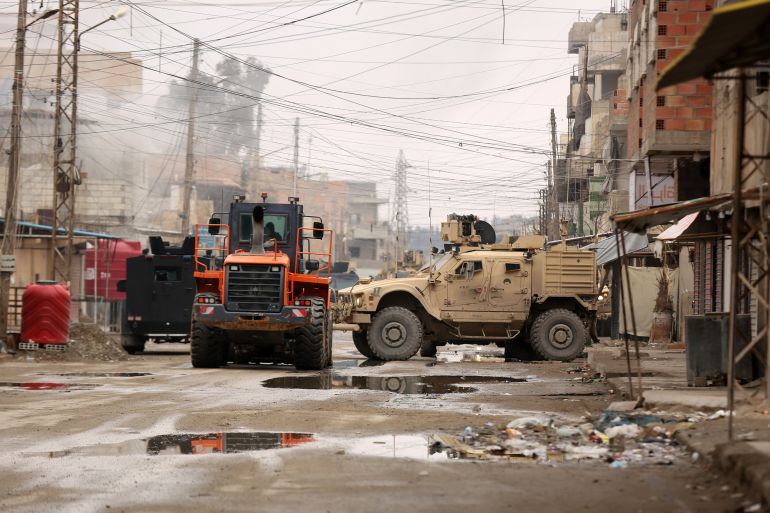SDF says no more anti-ISIL operations after Turkish attacks
The predominantly Kurdish group Turkey blames for the November 13 Istanbul bombing says it won’t cooperate with US anti-ISIL operations.

A Syrian group which Turkey accuses of being involved in the November 13 Istanbul bombing has said it will no longer participate in joint counterterrorism operations with the United States and other allies, as it continues to come under Turkish attack.
A spokesperson for the Syrian Democratic Forces (SDF), which controls territory in northern Syria, said on Friday that “all coordination and joint counterterrorism operations” with the US-led coalition battling remnants of ISIL (ISIS) in Syria as well as “all the joint special operations we were carrying out regularly” had been halted.
Keep reading
list of 3 itemsUS military reports rocket attacks on its patrol base in Syria
Turkish air attacks on Syria threaten US personnel: Pentagon
The SDF, which is primarily made up of the Kurdish-led People’s Protection Units (YPG), was the US’s main local ally in Syria in the fight against ISIL (ISIS).
However, Ankara considers the YPG to be the Syrian affiliate of the Kurdistan Workers’ Party, or the PKK, a designated “terrorist” group in Turkey, the US and the European Union.
Turkey has ramped up its shelling and air attacks on northern Syria in recent weeks and is preparing a ground operation against the YPG.
Turkish authorities blamed the group, as well as the PKK, for carrying out the Istanbul bombing, which killed six people, and said the suspected bomber had confessed to having been trained by the PKK in Syria.
The PKK, which has fought the Turkish state since 1984, and its affiliated groups have previously conducted attacks in Istanbul and elsewhere in the country.
The SDF has long threatened that fighting off a new Turkish incursion would divert resources away from protecting a prison holding ISIL fighters or fighting ISIL sleeper cells still waging hit-and-run attacks in Syria.
The Turkish bombardment – using both long-range weapons and air attacks – has frustrated its NATO ally Washington.
US defence secretary, Lloyd Austin, told his Turkish counterpart on Wednesday that the US was in “strong opposition to a new Turkish military operation in Syria”.
Austin also said Turkish raids had “directly threatened the safety of US personnel who are working with local partners in Syria to defeat ISIS”, according to the Pentagon.
However, Turkey has accused the US and other countries opposed to its attacks on the SDF of not taking Ankara’s security concerns seriously.
Turkey has conducted previous operations against the SDF and the YPG in northern Syria, taking vast swaths of territory. However, the groups continue to have a presence on the Syrian side of the Syria-Turkey border, a situation that Ankara is adamant must end.
Shelling and rocket attacks from northern Syria have hit Turkish border towns, leading to the death of three people in Karkamis on November 21.
The US-led coalition has backed the SDF with air strikes, military equipment and advisers since 2017, first helping it wrest back territory from ISIL and then supporting clearing operations against sleeper cells.
Pentagon spokesman Brigadier General Patrick Ryder had earlier told reporters that only joint patrols had been suspended and that operations against ISIL had not stopped.
The US-led coalition did not immediately respond to questions from the Reuters news agency on Friday about whether more operations had been suspended.
Sheikhmous Ahmed, the head of the SDF’s displacement department in Syria’s northeast, told Reuters that Turkish raids in late November had disrupted operations in and around al-Hol, a detention camp where women and children related to ISIL fighters are held.
He said humanitarian operations were suspended for several days and that some minors affiliated with ISIL had tried to escape but were caught.
A Western source briefed on the matter confirmed that there was “some worrying movement” in the section where foreign ISIL-linked women and children were held.
SDF head Mazloum Abdi said earlier this week he wanted a “stronger” message from Washington after seeing unprecedented Turkish deployments along the border.
“We are still nervous. We need stronger, more solid statements to stop Turkey,” he said. “Turkey has announced its intent and is now feeling things out. The beginning of an invasion will depend on how it analyses the positions of other countries.”